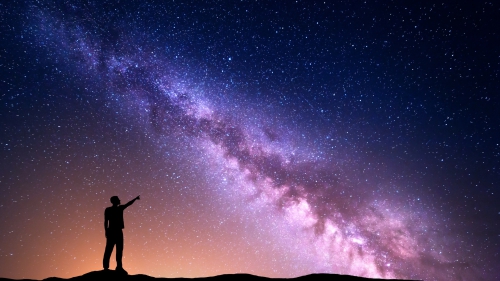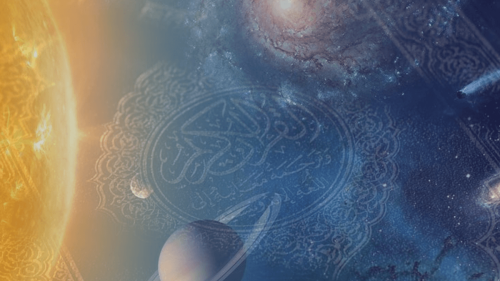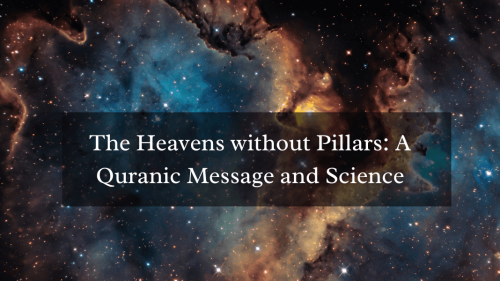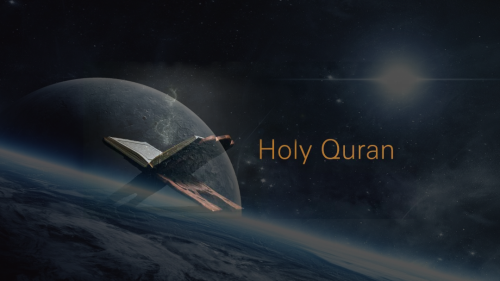The Heavens Declare the Glory of God

The James Webb Space Telescope, NASA's premier space observatory of the next decade, successfully launched on Christmas morning - December 25, 2021.
The James Webb Space Telescope (JWST), is the most sophisticated and complex observatory ever constructed. As light from the earliest stars has been stretched by the expansion of the universe over 13 billion years, we need instruments that work in infrared light, which we can feel as heat, to peer into the beginnings of our universe. JWST is so sensitive that it could theoretically detect the heat signature of a bumblebee at the distance of the moon.
The JWST will also investigate the atmospheres of planets around other stars to understand their origins and their potential habitability by living creatures; and when evidence of life is found, some people will be very upset.
Scientists also expect to use its more advanced capabilities to study the atmospheres of distant planets in the hope that signs of life might be detected.
When the inquisition condemned Galileo for writing that the earth might not be the center of the solar system, the Roman Catholic Church was supporting the philosophy and science of the Greco-Roman world because it seemed to support the religious idea that the earth, life in general and human life in particular, should be the center of God's world.
Almost ten years ago, the January 11, 2012 issue of the journal Nature reported that a study using gravitational microlensing suggests that almost every star in our galaxy has at least one planet circling it. “We used to think Earth was unique in our galaxy,” said Daniel Kubas, a co-lead author of the paper. “But now it seems that there probably are billions of planets with masses similar to Earth orbiting stars in the Milky Way.”
Other calculations, published in the scientific journal, Monthly Notices of the Royal Astronomical Society (Science Daily, 18 March 2015) show that billions of the stars in the Milky Way will have one to three planets in the habitable zone, where there is the potential for liquid water and where life could exist. As the Qur’an states: “…We made from water every living thing. Will they not then believe?
“We conclude that stars are orbited by planets as a rule, rather than the exception,” the team stated.
This means that life, which arose early in our planet's history, is very wide spread in our galaxy. Self aware, intelligent, tool making, language using, lifeforms are much rarer, since it took 99% of Earth's history for such forms to arise on Earth. So, if there are many millions of Earth like planets, there should be many thousands of planets inhabited by intelligent creatures. We are not alone.
Some religious leaders will object to this idea because they believe that humans are at the center of God's concern. Does not the Torah teach that humans are created in the image of God? As a Rabbi I would say YES! of course; but God's image does not refer to a physical form, because God does not have a body and does not incarnate, or reincarnate as an avatar, into a physical being.
God's image refers to a spiritual dimension; the combining of free will, moral choice (tree of knowledge of good and evil), artistic creativity, and the spiritual ability to experience awe and religious insight (Talmud Torah). This is clearly taught in the Biblical narrative of Adam, Eve and the Tree of Moral Knowledge.
Eve should get the credit for humans becoming more like God, who knows good and evil. (Genesis 3:5) If it was up to Adam alone Homo Sapience might have remained in a state of nature (Garden of Eden) for hundreds of thousands of years, like the species who lived before us. What makes us human is not tool use; many species use tools from chimps to crows.
But on planet Earth, only humans know, far in advance, that we will someday die: (Genesis 3:3) and only humans engage in religious ritual burials that prepare the departed soul for a future life. Only humans clothe themselves for reasons of modesty (Genesis 3:7). Only humans try to escape responsibility for their moral transgressions by blaming others. (Genesis 3:12)
When we encounter intelligent creatures from other planets they will also have these same religious values. Will intelligent species on other planets have a Qur’an and a Torah?
If you would prefer to live an amoral life like the 600+ species and subspecies of primates; then blame Eve and your mother for telling you again and again to behave yourself (Eve means moral life giver i.e. 'supermom' see Genesis 3:20)
As a Reform Rabbi, I have no doubt that when we are able to communicate with extraterrestrial intelligences, we will find that, just like humans, they all have various religions and forms of art and music. Those who believe that their own religion is the only true one will be in for a true shock.
This is nothing new for those who faithfully study Biblical and Qur'anic teachings that the Living God created the whole universe to be conducive to the universal evolution of life. The Zabur of David says, “Your kingdom is a kingdom of all worlds; and Your dominion is for all generations.” (Zabur-Psalms 145:13)
Perhaps this is why Jews and Muslims are so open to learning about new scientific discoveries. During Medieval times Christian theologians accepted the Ptolemaic earth centered Greek view of the universe as an absolute universal truth. The Catholic Inquisition even punished those who dared to voice other ideas. Some Christians still think that human beings must be at the literal center of God's creation.
Thus, even in America today, many Christians avoid learning about new scientific discoveries. According to a (February 2015) study "Religious Understandings of Science”, among members of non-Christian religions; 42 percent of Jews, and 52 percent of Muslims, Buddhists and Hindus (taken as a group) are twice as interested in new scientific discoveries compared to only 22 percent of Protestant evangelicals.
In October, 1995 the discovery of the first planet revolving around another sun-like star was proclaimed. In the following 26 years more than 4.000 additional exoplanets have been observed.
As the Qur'an says, “Verily in the heavens and on the earth are signs for those who believe.” (45:3) And prophet David says, “The heavens declare the glory of God. The universe proclaims God's handiwork.” (Zabur-Psalms 19:2)
Unlike the Catholic inquisition’s condemnation of Galileo, no Muslim or Jewish astronomer was ever condemned by a Muslim or Jewish inquisition, because Jews and Muslims never had an institution like the inquisition.
The Qur'an proclaims over and over again, "Whatever is in the heavens and whatever is on the earth exalts Allah" (Qur'an 57:1, 61:1, and 64:1) and the Zabur of Prophet David, King of Israel states; “The heavens declare the glory of God.” (Zabur of David-Psalm 19:2)
The Zohar, the central book of Jewish mysticism, says there are 12,000 worlds. (2:196a) And the Qur'an says, “We have not sent you but as a blessing for all the worlds.” (Al-Anbiya 107). Muslim commentators say this refers to the 18,000 worlds created by Allah. Our world is one of them. (Mir'at-e-Kainat, vol.1, p.77)
Topics: Cosmology, Science And Religion, Space And Astronomy, Universe, Webb Telescope
Views: 6042
Related Suggestions

















